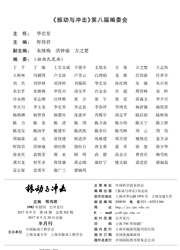

 中文摘要:
中文摘要:
循环荷载作用下饱和软黏土将产生应变软化现象,通过对宁波饱和软黏土开展温控动三轴试验,研究了温度、频率、初始偏应力、动应力和含水率对土体应变软化的影响,并在试验基础上建立了一个能够考虑温度影响的应变软化模型.结果表明:随着振动次数、初始偏应力、动应力和含水率的增加,土体软化加快,软化指数逐渐减小;随着频率和温度的提高,土体软化程度降低,软化指数增大;建立的软化模型可以较为合理地描述试验温度、频率、初始偏应力、动应力和含水率对土体应变软化特性的影响.
 英文摘要:
英文摘要:
The phenomenon of strain softening usually occurs in saturated soft clay under cyclic loading. A temperature-controlled cyclic triaxial test on Ningbo saturated soft clay was carried out uner different temperature loadings, frequencies, initial deviator stresses, dynamic stresses and moisture contents, and a mathematical model which can reflect the strain softening reasonably was set up on the basis of the test. It is observed that the softening index reduces with the increase of vibration number, initial deviator stress, dynamic stress and moisture content. On the other hand, higher frequency and temperature will increase the softening index. The presented model can reasonably describe the effects of temperature, frequency, initial deviator stress, dynamic stress and moisture content on the soil strain softening.
 同期刊论文项目
同期刊论文项目
 同项目期刊论文
同项目期刊论文
 期刊信息
期刊信息
